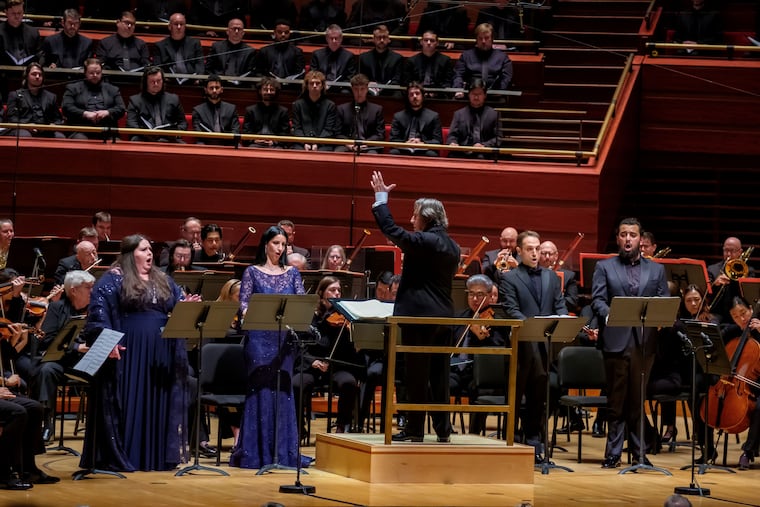Riccardo Muti returned to the Philadelphia Orchestra after nearly two decades for a thrilling Verdi Requiem
Soprano Angela Meade stepped in last minute without even rehearsing with the orchestra, and was astonishing.

Riccardo Muti returned to town this past week heralded by heaven-perched trumpets and presiding over scenes of destruction and eternal light.
The Verdi Requiem has long been a showcase for the Italian conductor’s razor-sharp sense of drama. But back on the Philadelphia Orchestra podium for the first time since 2005, the orchestra’s fifth music director held up the piece as a mirror of the ensemble itself, showing how much the orchestra has changed since he stepped down in 1992.
Muti, 83, always did have his own sense of orchestral sound, one that kept Eugene Ormandy’s homogeneity but turned it lean and muscular. In the single 90-minute work, Muti didn’t manage a restoration of the orchestra’s once-sacrosanct concept of blended instrumental colors. But there were strong signs of it — oboist Peter Smith on first chair for the piece, for instance, and the way his style matched the other woodwinds generally.
More striking was Muti’s ear for using color to heighten emotional meaning. The strings in the delicate opening were solid yet transparent, like quiet sighs. Eternal rest portrayed in sound.
It’s the vocal aspect of this work that usually draws attention — the wall-of-sound chorus and four soloists, and the fact that the thrilling character of the music is more fitting to the opera house than the church. The Philadelphia Symphonic Choir was both a powerhouse and model of exactitude.
But in terms of multiplying the dimensions of the well-trod text of the Mass, it’s all about Verdi’s concept of the orchestra as a place of theater, too. On bass drum and timpani, respectively, Christopher Deviney and Don S. Liuzzi weren’t surprising for their thunder, but for the quiet, subtle way their strokes became part of the sound of other instruments — mysterious thuds adding shadow and depth. Bassoonist Daniel Matsukawa was a standout for his eerily serpentine repeated figures, and at one point the score has some of the creepiest use of bassoons and flutes anywhere.
It’s really in this section, the “Libera me,” that Verdi creates his most dramatic canvas. Elsewhere in the work, mezzo-soprano Isabel De Paoli, tenor Giovanni Sala, and bass-baritone Maharram Huseynov each had wonderful qualities — they had the notes, voices of real character, and an impressive ability to create moments of great intimacy.
But much of the work depends on the soprano, and in the “Libera me,” Angela Meade was astonishing. More astonishing still, she was called in at the last minute. Soprano Iwona Sobotka wasn’t feeling well and pulled out, an orchestra spokesperson said. Meade had no rehearsals with the orchestra before curtain time — just a lengthy piano rehearsal with Muti and the soloists. And yet by Friday night, when I attended (the three-concert run in Marian Anderson Hall opened Thursday), Meade owned the part. She has a beautifully potent low range, penetrating and full of fire, and even when the orchestra and chorus were at their loudest, she was able to dominate, floating above.
It’s worth noting that Meade was one of many discoveries of Astral Artists, the Philadelphia group that recently announced its demise.
Much is made of the importance of chemistry between an orchestra and conductor, and there is definitely something to the idea. What was more apparent in this visit, however, is that chemistry happens when a series of tangibles are present. Muti balances instrumental sections with one another and consciously molds the sound of the ensemble. He pays close attention to details like the length of notes, how they decay and end, how phrases are shaped, and what kind of attacks are used (powerful, but never harsh).
And he gets it all through the clarity of his gestures. None of this, by the way, has anything to do with wisdom coming with age. This has long been who Muti is. The only question lingering after this visit: When can he come back, and how often?
Additional performance: Saturday at 8 p.m. in Marian Anderson Hall, Broad and Spruce Streets. Tickets are $66-$219. philorch.org, 215-893-1999.